Travelers 2012 Annual Report Download - page 14
Download and view the complete annual report
Please find page 14 of the 2012 Travelers annual report below. You can navigate through the pages in the report by either clicking on the pages listed below, or by using the keyword search tool below to find specific information within the annual report.-
 1
1 -
 2
2 -
 3
3 -
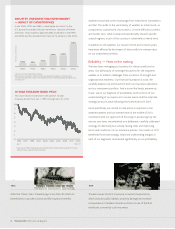 4
4 -
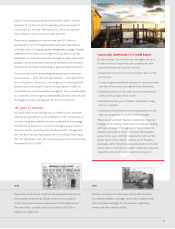 5
5 -
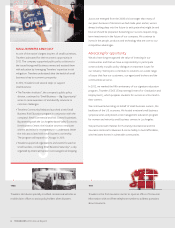 6
6 -
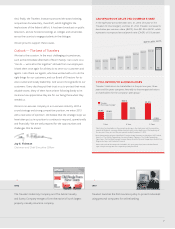 7
7 -
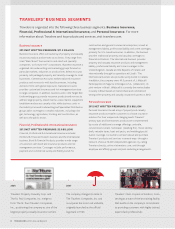 8
8 -
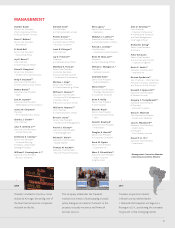 9
9 -
 10
10 -
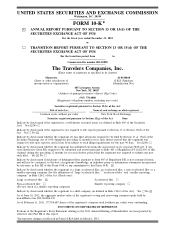 11
11 -
 12
12 -
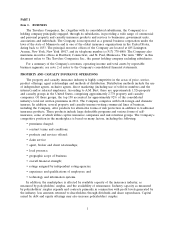 13
13 -
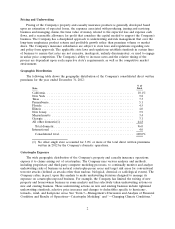 14
14 -
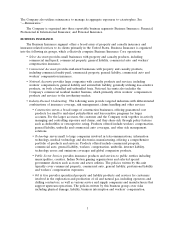 15
15 -
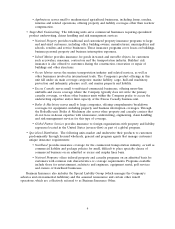 16
16 -
 17
17 -
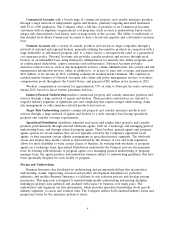 18
18 -
 19
19 -
 20
20 -
 21
21 -
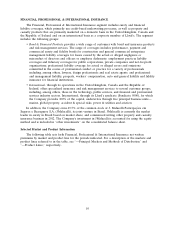 22
22 -
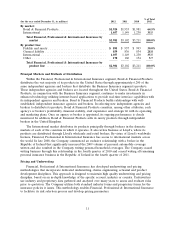 23
23 -
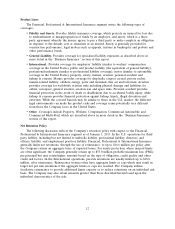 24
24 -
 25
25 -
 26
26 -
 27
27 -
 28
28 -
 29
29 -
 30
30 -
 31
31 -
 32
32 -
 33
33 -
 34
34 -
 35
35 -
 36
36 -
 37
37 -
 38
38 -
 39
39 -
 40
40 -
 41
41 -
 42
42 -
 43
43 -
 44
44 -
 45
45 -
 46
46 -
 47
47 -
 48
48 -
 49
49 -
 50
50 -
 51
51 -
 52
52 -
 53
53 -
 54
54 -
 55
55 -
 56
56 -
 57
57 -
 58
58 -
 59
59 -
 60
60 -
 61
61 -
 62
62 -
 63
63 -
 64
64 -
 65
65 -
 66
66 -
 67
67 -
 68
68 -
 69
69 -
 70
70 -
 71
71 -
 72
72 -
 73
73 -
 74
74 -
 75
75 -
 76
76 -
 77
77 -
 78
78 -
 79
79 -
 80
80 -
 81
81 -
 82
82 -
 83
83 -
 84
84 -
 85
85 -
 86
86 -
 87
87 -
 88
88 -
 89
89 -
 90
90 -
 91
91 -
 92
92 -
 93
93 -
 94
94 -
 95
95 -
 96
96 -
 97
97 -
 98
98 -
 99
99 -
 100
100 -
 101
101 -
 102
102 -
 103
103 -
 104
104 -
 105
105 -
 106
106 -
 107
107 -
 108
108 -
 109
109 -
 110
110 -
 111
111 -
 112
112 -
 113
113 -
 114
114 -
 115
115 -
 116
116 -
 117
117 -
 118
118 -
 119
119 -
 120
120 -
 121
121 -
 122
122 -
 123
123 -
 124
124 -
 125
125 -
 126
126 -
 127
127 -
 128
128 -
 129
129 -
 130
130 -
 131
131 -
 132
132 -
 133
133 -
 134
134 -
 135
135 -
 136
136 -
 137
137 -
 138
138 -
 139
139 -
 140
140 -
 141
141 -
 142
142 -
 143
143 -
 144
144 -
 145
145 -
 146
146 -
 147
147 -
 148
148 -
 149
149 -
 150
150 -
 151
151 -
 152
152 -
 153
153 -
 154
154 -
 155
155 -
 156
156 -
 157
157 -
 158
158 -
 159
159 -
 160
160 -
 161
161 -
 162
162 -
 163
163 -
 164
164 -
 165
165 -
 166
166 -
 167
167 -
 168
168 -
 169
169 -
 170
170 -
 171
171 -
 172
172 -
 173
173 -
 174
174 -
 175
175 -
 176
176 -
 177
177 -
 178
178 -
 179
179 -
 180
180 -
 181
181 -
 182
182 -
 183
183 -
 184
184 -
 185
185 -
 186
186 -
 187
187 -
 188
188 -
 189
189 -
 190
190 -
 191
191 -
 192
192 -
 193
193 -
 194
194 -
 195
195 -
 196
196 -
 197
197 -
 198
198 -
 199
199 -
 200
200 -
 201
201 -
 202
202 -
 203
203 -
 204
204 -
 205
205 -
 206
206 -
 207
207 -
 208
208 -
 209
209 -
 210
210 -
 211
211 -
 212
212 -
 213
213 -
 214
214 -
 215
215 -
 216
216 -
 217
217 -
 218
218 -
 219
219 -
 220
220 -
 221
221 -
 222
222 -
 223
223 -
 224
224 -
 225
225 -
 226
226 -
 227
227 -
 228
228 -
 229
229 -
 230
230 -
 231
231 -
 232
232 -
 233
233 -
 234
234 -
 235
235 -
 236
236 -
 237
237 -
 238
238 -
 239
239 -
 240
240 -
 241
241 -
 242
242 -
 243
243 -
 244
244 -
 245
245 -
 246
246 -
 247
247 -
 248
248 -
 249
249 -
 250
250 -
 251
251 -
 252
252 -
 253
253 -
 254
254 -
 255
255 -
 256
256 -
 257
257 -
 258
258 -
 259
259 -
 260
260 -
 261
261 -
 262
262 -
 263
263 -
 264
264 -
 265
265 -
 266
266 -
 267
267 -
 268
268 -
 269
269 -
 270
270 -
 271
271 -
 272
272 -
 273
273 -
 274
274 -
 275
275 -
 276
276 -
 277
277 -
 278
278 -
 279
279 -
 280
280 -
 281
281 -
 282
282 -
 283
283 -
 284
284 -
 285
285 -
 286
286 -
 287
287 -
 288
288 -
 289
289 -
 290
290 -
 291
291 -
 292
292 -
 293
293 -
 294
294 -
 295
295 -
 296
296 -
 297
297 -
 298
298 -
 299
299 -
 300
300
 |
 |

Pricing and Underwriting
Pricing of the Company’s property and casualty insurance products is generally developed based
upon an estimation of expected losses, the expenses associated with producing, issuing and servicing
business and managing claims, the time value of money related to the expected loss and expense cash
flows, and a reasonable allowance for profit that considers the capital needed to support the Company’s
business. The Company has a disciplined approach to underwriting and risk management that over the
long-term emphasizes product returns and profitable growth rather than premium volume or market
share. The Company’s insurance subsidiaries are subject to state laws and regulations regarding rate
and policy form approvals. The applicable state laws and regulations establish standards in certain lines
of business to ensure that rates are not excessive, inadequate, unfairly discriminatory, or used to engage
in unfair price competition. The Company’s ability to increase rates and the relative timing of the
process are dependent upon each respective state’s requirements, as well as the competitive market
environment.
Geographic Distribution
The following table shows the geographic distribution of the Company’s consolidated direct written
premiums for the year ended December 31, 2012:
% of
State Total
California .................................................. 10.1%
New York ................................................. 9.8
Texas ..................................................... 7.3
Pennsylvania ................................................ 5.1
Florida ................................................... 4.5
Illinois .................................................... 4.0
New Jersey ................................................ 3.9
Massachusetts .............................................. 3.4
Georgia ................................................... 3.1
All other domestic(1) ......................................... 44.8
Total domestic ............................................. 96.0
International ............................................... 4.0
Consolidated total .......................................... 100.0%
(1) No other single state accounted for 3.0% or more of the total direct written premiums
written in 2012 by the Company’s domestic operations.
Catastrophe Exposure
The wide geographic distribution of the Company’s property and casualty insurance operations
exposes it to claims arising out of catastrophes. The Company uses various analyses and methods,
including proprietary and third-party computer modeling processes, to continually monitor and analyze
underwriting risks of business in natural catastrophe-prone areas and target risk areas for conventional
terrorist attacks (defined as attacks other than nuclear, biological, chemical or radiological events). The
Company relies, in part, upon this analysis to make underwriting decisions designed to manage its
exposure on catastrophe-exposed business. For example, the Company has limited the writing of new
property and homeowners business in some markets and has selectively taken underwriting actions on
new and existing business. These underwriting actions on new and existing business include tightened
underwriting standards, selective price increases and changes to deductibles specific to hurricane-,
tornado-, wind- and hail-prone areas. See ‘‘Item 7—Management’s Discussion and Analysis of Financial
Condition and Results of Operations—Catastrophe Modeling’’ and ‘‘—Changing Climate Conditions.’’
2
